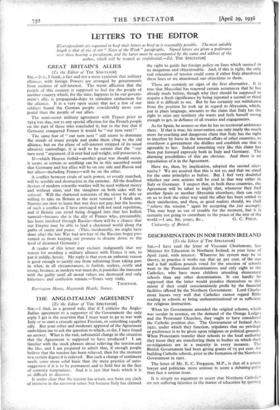THE ANGLO-ITALIAN AGREEMENT
[To the Editor of THE SpEcrAroll] Sin,—I find, as a general rule, that if I criticise the Anglo- Italian agreement to a supporter of the Government the only reply I get is the assertion that I must want to go to war with Italy or to start a crusade against Fascism, or something equally silly. But your sober and moderate approval of the Agreement emboldens me to ask the question to which, so far, I have found no answer. What is the real, substantial change in the situation that the Agreement is supposed to have produced ? I am familiar with the stock phrases about relieving the tension and the like, and I am prepared to admit that, if enough people believe that the tension has been relieved, then for the moment to a certain degree it is relieved. But such a change of sentiment needs some more solid basis than the mere practice of auto- suggestion if it is to be permanent and to hold fast in the face of contrary temptations. And it is just that basis which it is so difficult to discover.
It seems clear that the tension has arisen, not from any clash of interests in the narrower sense, but because Italy has claimed the right to guide her foreign policy on lines which seemed to us dangerous and objectionable. And, if this is right, the only real relaxation of tension could come if either Italy abandoned these lines or we abandoned our objections to them.
There are certainly no signs of the first alternative. It is true that Mussolini has renewed certain assurances that he has already made before, though why they should be supposed to acquire a fresh significance by being repeated a second or third time it is difficult to see. But he has certainly not withdrawn from the position he took up in regard to Abyssinia, which, put in plain language, amounts to the claim that Italy has the right to seize any territory she wants and feels herself strong enough to get, in defiance of all treaties and engagements.
As for Spain, he assures us that he has no territorial ambitions there. If that is true, his intervention can only imply the much more far-reaching and dangerous claim that Italy has the right to interfere by force in the internal affairs of other countries, to overthrow a government she dislikes and establish one that is agreeable to her. Indeed something very like this claim has been put forward expressly both in Italy and Germany. The alarming possibilities of this are obvious. And there is no repudiation of it in the Agreement.
Have we, then, by implication, adopted the second alter- native ? We are assured that this is not so, and that we stand for the same principles as before. But I feel very doubtful whether our own actions will be read in that way either in Italy or Germany. I suspect that, in both these countries, the Agreement will be taken to imply that, whenever they find another Spain or another Abyssinia elsewhere, they can rely on us to look the other way until the affair has been settled to their satisfaction, and then, as good realists should, we shall "relieve the tension" again by accepting the fait accompli. This may keep us out of trouble for the moment, but it is certainly not going to contribute to the peace of the rest of the world.—I am, Sir, yours, &c., G. C. FIELD. University of Bristol.


























































 Previous page
Previous page